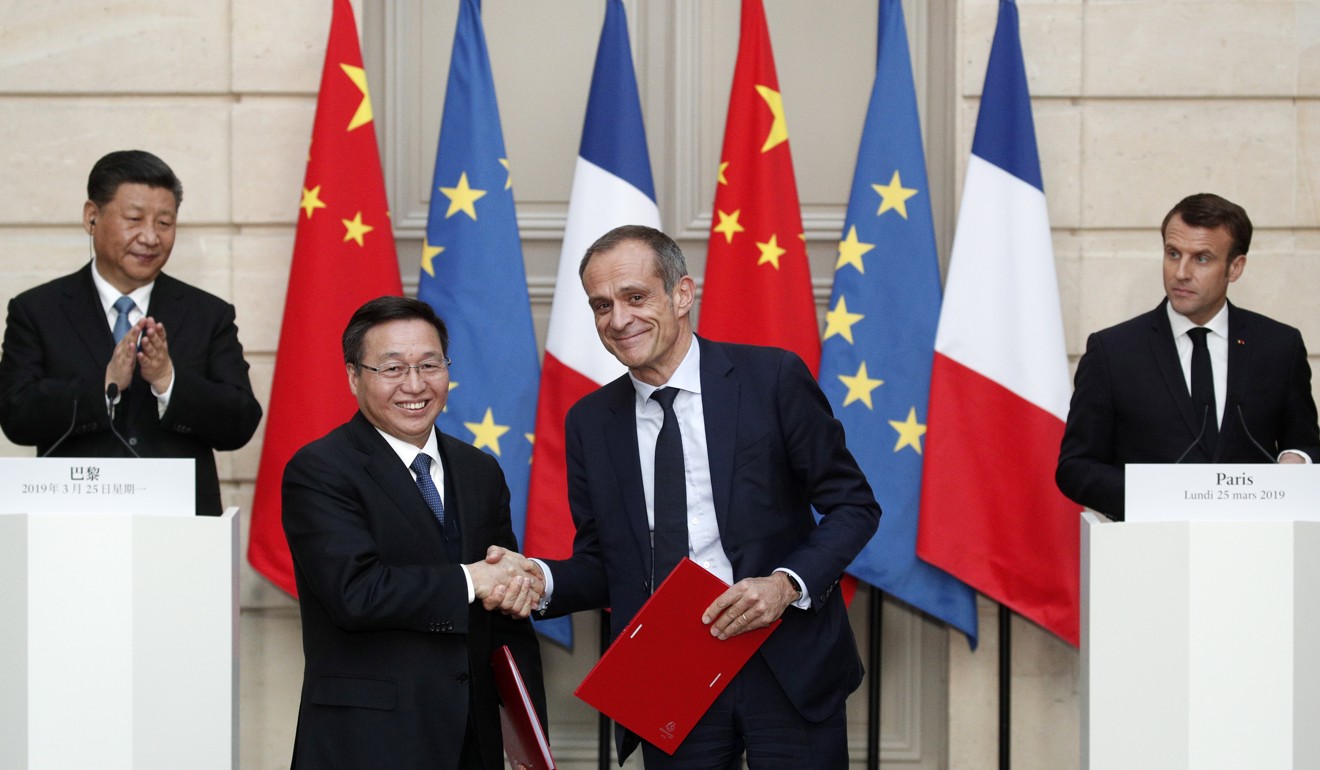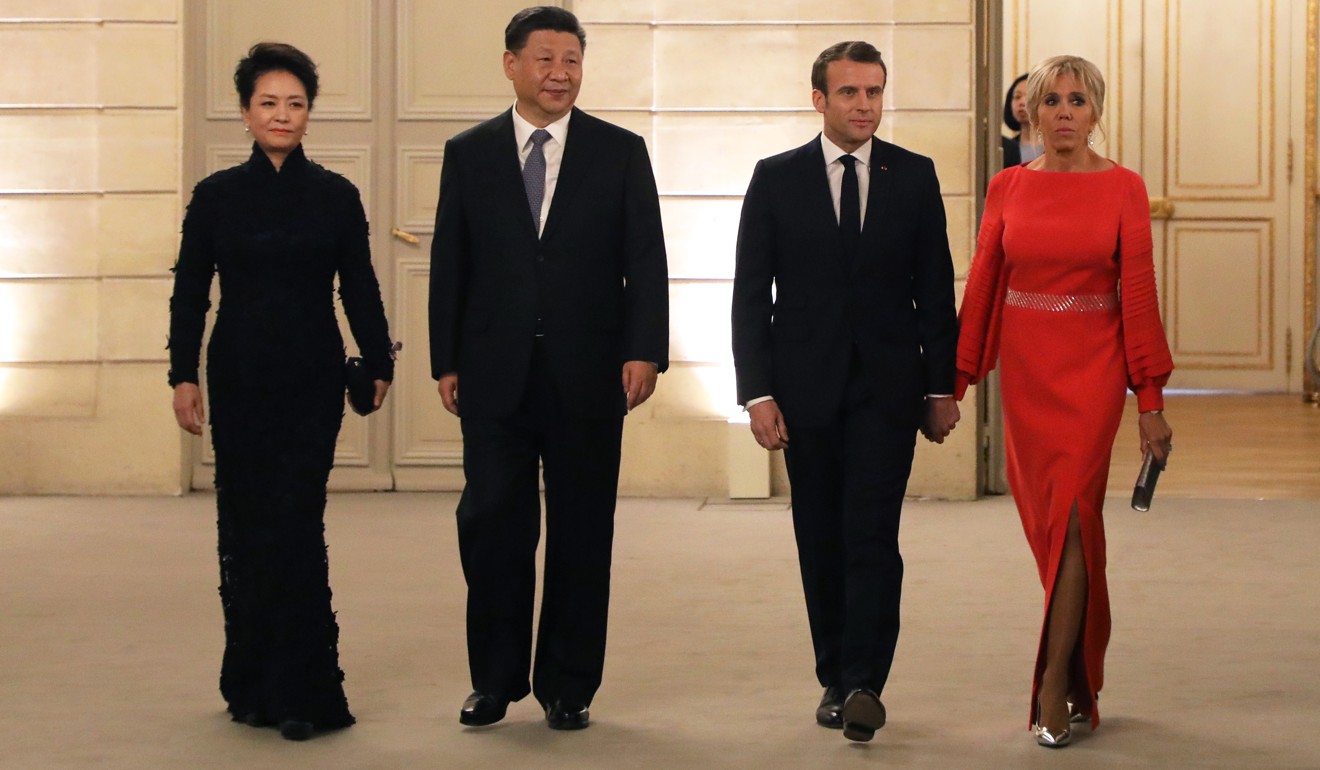
China, France sign US$45 billion of deals including Airbus order
- French President Emmanuel Macron calls for a ‘strong Europe-China partnership’ despite his criticism of Italy endorsing the belt and road scheme
- Chinese leader Xi Jinping describes bilateral ties as ‘sound and stable’

China and France called for increased cooperation and signed multibillion-dollar deals on Monday, despite French President Emmanuel Macron’s recent swipe at Beijing’s huge investments in Europe.
Brushing aside their differences on the controversial “Belt and Road Initiative”, Xi described bilateral ties with France as “sound and stable” and oversaw with Macron the signing of 15 business deals totalling about €40 billion (US$45 billion), including an order for 300 Airbus planes.
The larger-than-expected aircraft deal, estimated at €30 billion at catalogue prices, matched an order for 300 Boeing planes when US President Donald Trump visited Beijing in November 2017.
Other deals ranged from the renewable energy sector to shipping and banking as well as Beijing’s agreement to lift an embargo on French poultry.
A letter of intent on space collaboration was also signed, allowing Paris to send French scientific instruments to China’s lunar mission Chang’e 6 scheduled for around 2023, according to the French space agency CNES.

Analysts noted Xi’s visit came as China-EU relations were at a crossroads, with major European countries increasingly vocal against China’s unfair trade policies, investment inroads and unfulfilled reform promises.
Gal Luft, co-director of the Washington-based Institute for the Analysis of Global Security, said
Xi’s trip to Europe highlighted the confusion and disharmony dominating the continent at the moment.
“Europe needs economic lifelines that none of the non-European G7 countries, the US included, seem to be willing to avail. Money talks, and China is willing to put some on the table. All the rest is hot air,” he said.
Macron, who led a recent European Union effort to redefine its China policy and criticised Italy for becoming the first G7 country to endorse Beijing’s belt and road scheme over the weekend, hailed Xi’s visit as an “excellent signal” of the strength and reliability of bilateral relations.
The French president called for a “strong Europe-China partnership, based on clear, strict and ambitious rules” as well as “strong multilateralism” and “fair and balanced” trade, in a veiled swipe at Trump’s unilateralism and his “America first” policy.
“Europe must be united and have a coherent message. That’s what we are doing on strategic investments,” Macron said on Monday in a joint address with Xi following their talks at the Elysee Palace, without taking any questions.
Xi reiterated China’s support for a united Europe and stressed that mutual trust remained the key to good relations between major powers such as China and France in a world of uncertainties and “major changes rarely seen in a century”.
“In politics, we should not only build a strong ‘dam’ of mutual trust, but also a ‘lighthouse’ of ideal,” Xi was quoted by Xinhua as saying.
Macron was also quoted by the Chinese state news agency as making an offer to align France’s industrial policy with Beijing’s “Made in China 2025” strategy, which has been a hot-button issue in Trump’s trade war with China. Washington has accused Beijing of using the state-led strategy to help China replace the US as global industrial leader.
Earlier in the day, Macron rolled out the red carpet for Xi and his wife Peng Liyuan at the Arc de Triomphe monument and hosted a state dinner at the Elysee Palace in Paris.

Two French fighter jets escorted Xi’s plane, according to Xinhua, as it flew to Paris from Nice, where Xi arrived and had a private dinner with the French leader on Sunday.
Shi Zhiqin, an international relations professor at Tsinghua University, noted Xi’s visit to Paris, the second in five years, came at a sensitive time, with the EU caught between the escalating rivalry between China and the US.
China’s belt and road strategy and Xi’s spending spree have been criticised as a tactic by Beijing to undermine EU unity and pit European powers against each other.
“Major European powers are beleaguered by domestic chaos, economic stagnancy and deep-running divisions among themselves. It’s not at all surprising that China has become the scapegoat as the EU is in a dilemma on how to deal with a rising Beijing,” he said.
Xi’s visit also came a day ahead of a meeting in Paris between Xi, Macron, German Chancellor Angela Merkel and EU Commission chief Jean-Claude Juncker, focusing on exploring “points of convergence” between China and the EU.
Steve Tsang, director of the SOAS China Institute in London, said with the EU divided ahead of parliamentary elections in May, it would be difficult for European leaders to take a united stance on China any time soon, especially after Italy’s move.
“Italy breaking ranks with the ‘big four’ within the EU will pose a serious challenge to the EU acting as one, amidst Brexit getting close to a climax. The EU is as distracted as it can be at the moment,” he said.
But despite the breakthrough to enlist Italy’s support, analysts said Xi had a tough job in convincing his other European hosts.
“The fact that notwithstanding [a deepening EU division], it still produced the policy document on relations with China [which billed China as a systemic rival for the first time] early this month shows how much Xi has managed to force China onto the agenda of EU leaders – and not in a way that Xi would like to see,” Tsang said.
Luft said the cacophony in Europe had enabled China to exploit weak spots within the EU system.
“This is not a divide and rule strategy, as China has no aspiration to rule Europe, but it is certainly some form of opportunism. After all, China needs to direct its trade and investment to somewhere and Europe is still an attractive destination,” he said. “However, China’s test will be in the implementation front. The world is no longer impressed by Chinese announcements of multibillion-dollar deals, as many of those deals have proven to be aspirational and never saw the light of day.”
Luft added that China’s challenge would be how to show it was serious, so that European countries considering following in Italy’s footsteps would feel they had much to gain.
“Failure to deliver tangible gains in a short period of time would lead to European disappointment and resentment and this could easily lead to a decline in EU-China relations, which, unlike EU-US relations, are not based on values and common security but rather on pure mutual economic interests,” he said.